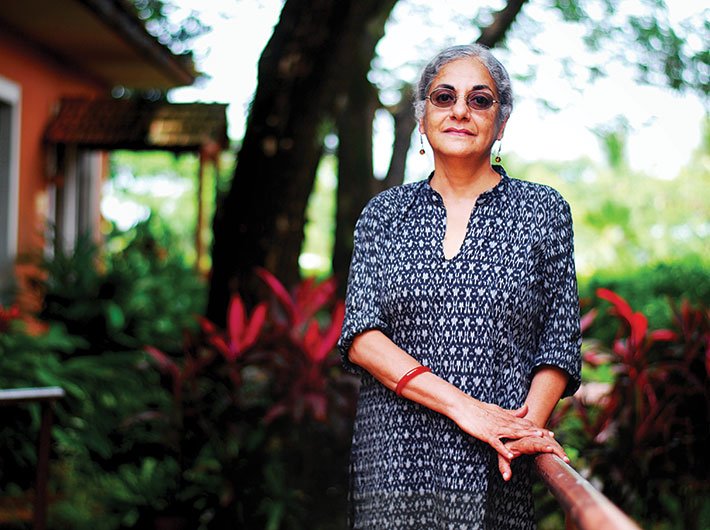“What kind of learning or writing can happen if you are not even allowed to discuss the world you live in?”
How do you view the state of contemporary Indian literature?
Our cultural spaces are in a bad state – and this affects the writing, publishing and reading of literature. Over the last few years, we have seen far too many cases of the self-appointed thought police intimidating writers. From the Tamil writer Perumal Murugan to the young Kannada poet Huchangi Prasad, right-wing groups have hounded, or physically attacked, our writers for doing what they should: picking up a pen and writing imaginatively about the India they know. And in the case of the scholar and translator MM Kalburgi, the attack was fatal.
The government has either looked the other way, or actively encouraged censorship through intimidation; self-censorship by writers and publishers because of the prevailing atmosphere of fear; and division of the writers’ community by identifying language with community, as for instance in the case of asking Urdu writers to sign an undertaking that they will not write anything “anti-national” when they apply for a state grant.
Also, attacks on university spaces will always have an effect on writing and reading. Educational institutions, research institutions and cultural institutions are there to provide a physical and intellectual space for writers, readers and scholars to grapple with the questions they are trying to understand and articulate. No writing – or any intellectual breakthrough – is possible without discussion, debate and speculation. If these are curbed, our knowledge stagnates, and so do writing and reading.
Let me give you just one small example: the eminent sociologist Ghanshyam Shah recently organised a seminar on caste in the MS University in Gujarat. The seminar was cancelled because there may be objections from “some people”. What kind of learning or writing can happen if you are not even allowed to discuss the world you live in?
Fiction is beyond facts – in order to capture truth. How does a novelist view post-truth politics?
I am not sure what you mean by fiction being ‘beyond’ facts. To talk of fact-versus-fiction seems to imply that one is true and the other false, and this is a limited understanding of truth. So let me use the word ‘reality’ rather than ‘facts’.
Fiction has a strong relationship with reality; but it has many strategies available to it to reflect, present or question the real-life situation it addresses. For example, you may write a fantasy or a parable or an allegory, or use caricature, but it is still a comment on the real world. OV Vijayan and Mahasweta Devi both wrote allegorical short stories about the Emergency. Fiction finds a range of ways to present the reality around us. As for politics: I don’t see this as separate from the novelist; all of us are part of a complex political system, even if the novelist’s stance is against this system.
What do you have to say about the governance of government-run cultural institutions like Sahitya Akademi?
In times when we see many of the government-run cultural institutions, from Councils to Akademis, eroded by deadweight bureaucracy, cliques or the predominant right-wing ideology, there is a feeling among cultural practitioners that these institutions no longer really belong to us. But these institutions were set up because the leaders of our newly independent republic wanted to build platforms for our diverse cultures to interact with each other and thrive. They belong to all of us, these platforms, writers, readers, taxpayers. So we can’t let them go. We must fight for them to be reinvented.
Do you see freedom of speech as absolute always?
In a country guided by a reasonable constitution, *citizens’ rights* are absolute. We have the idea of hate speech – useful, I think, in a society as diverse as ours.
But let me ask a few questions of my own. We always discuss freedom of speech in these binary terms of absolute versus restricted. It may be useful to shift the focus a little, and ask, for instance: Why does the perfectly logical limitation of “other citizens’ rights” always get articulated in real life as a “law and order situation”? Surely we should not encourage intimidation, or “hurt sentiment” as a means of expressing these other citizens’ rights?
As for the other restriction, national security, this is, sadly, misused. Freedom of speech is an index of the maturity of a society; and in a diverse country like ours, the more we encourage expression of differing points of view, oppositional voices, the better. But we seem to be in a situation where threats of violence and rape take place in public space such as social media rather than a debate of ideas. What do you expect of a society where the ruling ideology encourages trolls and not its scholars, writers and artists?
Some authors have maintained that novels should be free of politics and social responsibility. What would be your answer to them?
Novels and paintings and films do not have to be overt in their political take; they are not pamphlets or propaganda. But every one of us has a world view, and this view is essentially our reading of power structures, how one group of people relate to another. You may write a “small” love story, but it would not work if the writer does not locate these two individuals. Even if the man and woman are identical in every way – which sounds like a boring and unlikely story – there is still the difference between man and woman. What I am trying to say is that the minute you have any kind of “difference”, you also open up the possibility of power relationships, the basis, to put it crudely, of politics.
It has been over 20 years since you contested the Hindu Minority and Guardianship Act. Do you think it was successful in becoming a stepping stone in challenging the discriminatory nature of our laws?
It was one small step. Its value will only be realised the more it is used as a precedent in specific cases in court. Also, modifications of the law don’t work on their own. They are meaningful only if there is also questioning of discriminatory practices in classrooms, in media, in popular culture, homes, and on the street.
What’s your take on uniform civil code? Is our country ready for it?
I do not know enough to make this sort of pronouncement. I can only say that this is an ideal we should work toward, but not if it is a tool to homogenise the country and beat the minorities into submission. It has to be a democratic, inclusive exercise, and the question is whether such a thing is possible in the current Indian situation.
yoshika@governancenow.com
(The interview appears in the April 16-30, 2017 issue of Governance Now)

